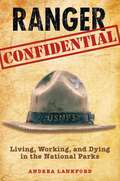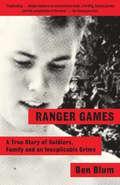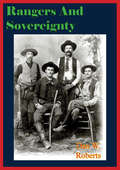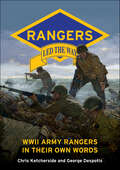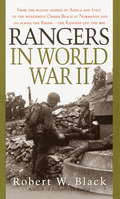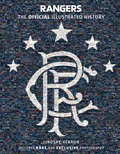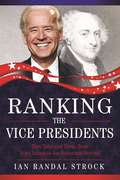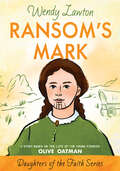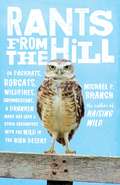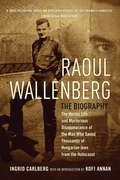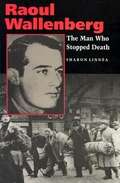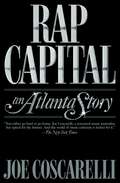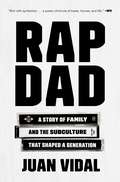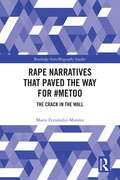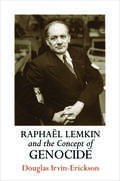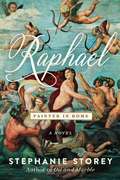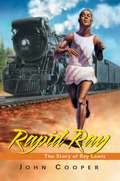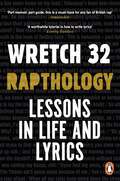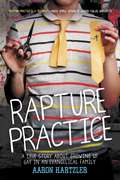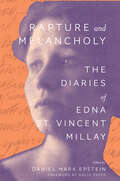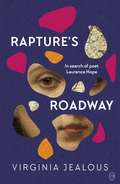- Table View
- List View
Ranger Confidential: Living, Working, and Dying in the National Parks
by Andrea LankfordFor twelve years, Andrea Lankford lived in the biggest, most impressive national parks in the world, working a job she loved. She chaperoned baby sea turtles on their journey to sea. She pursued bad guys on her galloping patrol horse. She jumped into rescue helicopters bound for the heart of the Grand Canyon. She won arguments with bears. She slept with a few too many rattlesnakes.Hell yeah, it was the best job in the world! Fortunately, Andrea survived it.In this graphic and yet surprisingly funny account of her and others&’ extraordinary careers, Lankford unveils a world in which park rangers struggle to maintain their idealism in the face of death, disillusionment, and the loss of a comrade killed while holding that thin green line between protecting the park from the people, the people from the park, and the people from each other. Ranger Confidential is the story behind the scenery of the nation&’s crown jewels—Yosemite, Grand Canyon, Yellowstone, Great Smokies, Denali. In these iconic landscapes, where nature and humanity constantly collide, scenery can be as cruel as it is redemptive.
Ranger Games: A Story of Soldiers, Family and an Inexplicable Crime
by Ben Blum"A gloriously good writer...Ranger Games is both surprising and moving...A memorable, novelistic account."—Jennifer Senior, New York Times Intricate, heartrending, and morally urgent, Ranger Games is a crime story like no other Alex Blum was a good kid, a popular high school hockey star from a tight-knit Colorado family. He had one goal in life: endure a brutally difficult selection program, become a U.S. Army Ranger, and fight terrorists for his country. He poured everything into achieving his dream. In the first hours of his final leave before deployment to Iraq, Alex was supposed to fly home to see his family and beloved girlfriend. Instead, he got into his car with two fellow soldiers and two strangers, drove to a local bank in Tacoma, and committed armed robbery... The question that haunted the entire Blum family was: Why? Why would he ruin his life in such a spectacularly foolish way? At first, Alex insisted he thought the robbery was just another exercise in the famously daunting Ranger program. His attorney presented a case based on the theory that the Ranger indoctrination mirrored that of a cult. In the midst of his own personal crisis, and in the hopes of helping both Alex and his splintering family cope, Ben Blum, Alex’s first cousin, delved into these mysteries, growing closer to Alex in the process. As he probed further, Ben began to question not only Alex, but the influence of his superior, Luke Elliot Sommer, the man who planned the robbery. A charismatic combat veteran, Sommer’s manipulative tendencies combined with a magnetic personality pulled Ben into a relationship that put his loyalties to the test.
Rangers And Sovereignty
by Dan W. RobertsA gripping slice of Americana, telling the exciting tale of Texas Ranger Daniel Webster Roberts' Ranger service. As Captain of Company D, this book details the social life of the rangers, their relations with frontier society, their food, dress, and entertainment."We set out in this writing to record the work of Company "D", Frontier Battalion, not for any selfish consideration. But, being almost importuned by our real friends to do so, we thought we could tell what we really know to be true in a way that might spin out a thread strong enough to bind together an intelligent idea of the needs of that service, how the service was performed, and at least a vision of the final disposition of the horrid Indian question. Our egotism doesn't lead us to say that Texas did it all; but our little part is richly treasured in the archives of our "native heath"--Texas. Our sorrows are there, also, in many a grave not even marked by human hands to show where our brave defenders met death--yielding the last sacrifice in defense of Texas."
Rangers Led the Way: WWII Army Rangers in Their Own Words
by Chris Ketcherside George DespotisInterviews with 20 WWII 1st, 2nd, 3rd, 4th, and 5th Battalion Rangers
Rangers in World War II: Darby's Rangers In World War Ii
by Robert W. BlackFrom the deadly shores of North Africa to the invasion of Sicily to the fierce jungle hell of the Pacific, the contribution of the World War II Ranger Battalions far outweighed their numbers. They were ordinary men on an extraordinary mission, experiencing the full measure of the fear, exhaustion, and heroism of combat in nearly every major invasion of the war. Whether spearheading a landing force or scouting deep behind enemy lines, these highly motivated, highly trained volunteers led the way for other soldiers -- they were Rangers.With first-person interviews, in-depth research, and a complete appendix naming every Ranger known to have served, author Robert Black, a Ranger himself, has made the battles of WWII come to life through the struggles of the men who fought to win the greatest war the world has ever seen.
Rangers: A Visual Celebration of 140 Glorious Years
by Rangers Fc Lindsay HerronPeppered throughout with more than 200 images from Ibrox's official archives - many of them never before published - this sumptious publication captures the club's rich heritage and proud pedigree of great managers and players, devoted fans, and an almost endless list of trophies. Rangers FC has experienced the highs and lows of everything that the sport can throw at it, yet the passion and faith of its enormous fan base continues to endure as the club enters a brave new era. This evocative new publication seeks to pay testament to the Ibrox spirit and everything it stands for.
Rangers: A Visual Celebration of 140 Glorious Years
by Rangers Fc Lindsay HerronPeppered throughout with more than 200 images from Ibrox's official archives - many of them never before published - this sumptious publication captures the club's rich heritage and proud pedigree of great managers and players, devoted fans, and an almost endless list of trophies. Rangers FC has experienced the highs and lows of everything that the sport can throw at it, yet the passion and faith of its enormous fan base continues to endure as the club enters a brave new era. This evocative new publication seeks to pay testament to the Ibrox spirit and everything it stands for.
Ranking the Vice Presidents: True Tales and Trivia, from John Adams to Joe Biden
by Ian Randal StrockWith all eyes on their Presidential bosses, the Vice Presidents of the United States have often been relegated to the background. But they are an intriguing group, and now-in this unprecedented and meticulously researched volume-the forty-seven men who have held this position take center stage.Anyone interested in going beyond the headlines and learning about the history of powers behind the Oval Office will want to pore over this one-of-a-kind reference. Here you will find the information you never knew you needed to know about the Vice Presidents, such as who lived the longest, who got married in office, who won the Nobel Prize, and who was charged with treason. Packed with facts, trivia, and lists about all of America’s VPs as well as many of the country’s high-ranking political appointees, Ranking the Vice Presidents presents the hidden history of the nation’s second-in-command.
Ransom's Mark: A Story Based on the Life of the Young Pioneer Olive Oatman (Daughters of the Faith Series)
by Wendy LawtonWhen 13-year-old Olive Oatman's wagon train is raided by outlaw Yavapai Indians, she and her sister are captured. After enduring harsh treatment, they are ransomed by a band of Mohaves. Olive struggles to adjust to her new life, but finds comfort in her faith and in an unexpected friendship. When the time comes for her to return to the white world, she is afraid she will never fit in. But she learns to see the Mohave design tattooed on her chin as a sign of God's love and deliverence, a mark of ransom.
Ransom's Mark: A Story Based on the Life of the Young Pioneer Olive Oatman (Daughters of the Faith Series)
by Wendy LawtonWhen 13-year-old Olive Oatman's wagon train is raided by outlaw Yavapai Indians, she and her sister are captured. After enduring harsh treatment, they are ransomed by a band of Mohaves. Olive struggles to adjust to her new life, but finds comfort in her faith and in an unexpected friendship. When the time comes for her to return to the white world, she is afraid she will never fit in. But she learns to see the Mohave design tattooed on her chin as a sign of God's love and deliverence, a mark of ransom.
Rants from the Hill: On Packrats, Bobcats, Wildfires, Curmudgeons, a Drunken Mary Kay Lady, and Other Encounters with the Wild in the High Desert
by Michael P. Branch“If Thoreau drank more whiskey and lived in the desert, he’d write like this.”—High Country News Welcome to the land of wildfire, hypothermia, desiccation, and rattlers. The stark and inhospitable high-elevation landscape of Nevada’s Great Basin Desert may not be an obvious (or easy) place to settle down, but for self-professed desert rat Michael Branch, it’s home. Of course, living in such an unforgiving landscape gives one many things to rant about. Fortunately for us, Branch—humorist, environmentalist, and author of Raising Wild—is a prodigious ranter. From bees hiving in the walls of his house to owls trying to eat his daughters’ cat—not to mention his eccentric neighbors—adventure, humor, and irreverence abound on Branch’s small slice of the world, which he lovingly calls Ranting Hill.
Raoul Wallenberg: The Heroic Life And Mysterious Disappearance Of The Man Who Saved Thousands Of Hungarian Jews From The Holocaust
by Ingrid CarlbergAn Honorary Citizen of the United States and Canada, and designated as one of the Righteous among the Nations by Israel, Raoul Wallenberg was a modest envoy to Hungary whose heroism in Budapest at the height of the Holocaust saved countless Jewish lives, and ultimately cost him his own.A series of unlikely coincidences led to the appointment of Wallenberg, by trade a poultry importer, as Sweden's Special Envoy to Budapest in 1944. With remarkable bravery, Wallenberg created a system of protective passports, and sheltered thousands of desperate Jews in a special "international ghetto" created in collaboration with other neutral countries. As the war drew to a close, his invaluable work almost complete, Wallenberg voluntarily went to meet with the Soviet troops who were relieving the city. Arrested as a spy, Wallenberg disappeared into the depths of the Soviet system, never to be seen again.In this definitive biography, noted journalist Ingrid Carlberg has carried out unprecedented research into all elements of Wallenberg's life, narrating with vigor and insight the story of a heroic life, and navigating with wisdom and sensitivity the truth about his disappearance and death.
Raoul Wallenberg: The Man Who Stopped Death, First Edition
by Sharon LinneaThe book traces the life of the Swedish diplomat who saved Hungarian Jews during World War II and then mysteriously disappeared after the Russians occupied Budapest.
Rap Capital: An Atlanta Story
by Joe CoscarelliAn &“impassioned tribute&” (Publishers Weekly, starred review) to the most influential music culture today, Atlanta rap—a masterful, street-level story of art, money, race, class, and salvation from acclaimed New York Times reporter Joe Coscarelli.From mansions to trap houses, office buildings to strip clubs, Atlanta is defined by its rap music. But this flashy and fast-paced world is rarely seen below surface level as a collection not of superheroes and villains, cartoons and caricatures, but of flawed and inspired individuals all trying to get a piece of what everyone else seems to have. In artistic, commercial, and human terms, Atlanta rap represents the most consequential musical ecosystem of this century. Rap Capital tells the dramatic stories of the people who make it tick and the city that made them that way. The lives of the artists driving the culture, from megastars like Lil Baby and Migos to lesser-known local strivers like Lil Reek and Marlo, represent the modern American dream but also an American nightmare, as young Black men and women wrestle generational curses, crippled school systems, incarceration, and racism on the way to an improbably destination atop art and commerce. Across Atlanta, rap dreams power countless overlapping economies, but they&’re also a gamble, one that could make a poor man rich or a poor man poorer, land someone in jail or keep them out of it. Drawing on years of reporting, more than a hundred interviews, dozens of hours in recording studios and on immersive ride-alongs, acclaimed New York Times reporter Joe Coscarelli weaves a cinematic tapestry of this singular American culture as it took over in the last decade, from the big names to the lesser-seen prospects, managers, grunt-workers, mothers, DJs, lawyers, and dealers that are equally important to the industry. The result is a deeply human, era-defining book that is &“required reading for anyone who has ever wondered how, exactly, Atlanta hip-hop took over the world&” (Kelefa Sanneh, author of Major Labels). Entertaining and profound, Rap Capital is an epic of art, money, race, class, and sometimes, salvation.
Rap Dad: A Story of Family and the Subculture That Shaped a Generation
by Juan VidalA timely reflection on identity in America, exploring the intersection of fatherhood, race, and hip-hop culture.Just as his music career was taking off, Juan Vidal received life-changing news: he’d soon be a father. Throughout his life, neglectful men were the rule—his own dad struggled with drug addiction and infidelity—a cycle that, inevitably, wrought Vidal with insecurity. At age twenty-six, with only a bare grip on life, what lessons could he possibly offer a kid? Determined to alter the course for his child, Vidal did what he’d always done when confronted with life’s challenges. He turned to the counterculture. “The counterculture took the place of a father I could no longer touch. Since things like school and church couldn’t get through to me, I was being trained up outside of organized institutions. What I gravitated to were these movements that not only felt redeeming, but also freeing. They were almost everything I needed.” In Rap Dad, the musician-turned-journalist takes a thoughtful and inventive approach to exploring identity and examining how we view fatherhood in a modern context. To root out the source of his fears around parenting, Vidal revisits the flash points of his juvenescence, a feat that transports him, a first-generation American born to Colombian parents, back to the drug-fueled streets of 1980s–90s Miami. It’s during those pivotal years that he’s drawn to skateboarding, graffiti, and the music of rebellion: hip-hop. As he looks to the past for answers, he infuses his personal story with rap lyrics and interviews with some of pop culture’s most compelling voices—plenty of whom have proven to be some of society’s best, albeit nontraditional, dads. Along the way, Vidal confronts the unfair stereotypes that taint urban men—especially Black and Latino men—in today’s society. An illuminating journey of discovery, Rap Dad is a striking portrait of modern fatherhood that is as much political as it is entertaining, personal as it is representative, and challenging as it is revealing.
Rape Narratives that Paved the Way for #MeToo: The Crack in the Wall (Routledge Auto/Biography Studies)
by Marta Fernández-MoralesThis book examines a decade of rape memoirs produced by English-speaking women around the emergence of #MeToo as a global phenomenon. It argues that their auto/biographical praxis opened a crack in the long-standing wall of silence that the 2017 online campaign and its echoes, still resonating today, are systematically eroding. Jana Leo, Joanna Connors, Roxane Gay, Myriam Gurba, Chanel Miller, Jeannie Vanasco, Eve Ensler, Thordis Elva, and other survivors helped set and reaffirm the bases for the current zeitgeist around sexual violence, characterized by a tsunami of stories in circulation and a growing audience that is more ready than ever to listen to the victims ethically and empathically. This volume offers an in-depth analysis of a literary corpus that contributes to the conversation about the narrative politics of the fourth wave of feminism and some of its key preoccupations, such as consent, accountability, and justice. Of particular value for academics and activists working on/against sexual violence, as well as for life writing and gender studies scholars, it can also be useful to specialists in the fields of ethics, affect theory, trauma studies, memory studies, cultural studies, phenomenology, victimology, or ethnic and minority studies.
Rape New York
by Jana LeoIn the gripping first pages of this true story, Jana Leo relives the moment-by-moment experience of a home invasion and rape in her own apartment in Harlem. After she reports the crime, she waits. Between police disinterest and squabbles from the health insurance company over who's going to pay for the rape kit, she realizes that the violence of such an experience does not stop with the crime. Increasingly concerned that the rapist will return (to harm her or other women in the building), she seeks help from her landlord, who refuses to address security issues on the property. She comes to understand that it is precisely these conditions of newly gentrified lower-income areas which lead to vulnerable living spaces, high turnover rates, and ultimately higher profits for these slumlords. In this most singular memoir, Leo weaves a psychological journey into an analysis that becomes equally personal: the fault lines of property mismanagement, class vulnerabilities, and a deeply flawed criminal justice system. In a stunning conclusion, Leo has her day in court.Jana Leo taught at Cooper Union for seven years and now divides her time between Madrid and New York. In 2007 she founded Civic Gaps, a New York think tank dedicated to studying empty or neglected spaces in the city.
Raphael (Getting to Know the World's Greatest Artists)
by Mike VeneziaBriefly introduces Raphael, a well-known Italian painter, who modeled several styles and techniques and made them his own.
Raphael Lemkin and the Concept of Genocide (Pennsylvania Studies in Human Rights)
by Douglas Irvin-EricksonRaphaël Lemkin (1900-1959) coined the word "genocide" in the winter of 1942 and led a movement in the United Nations to outlaw the crime, setting his sights on reimagining human rights institutions and humanitarian law after World War II. <P><P>After the UN adopted the Convention on the Prevention and Punishment of the Crime of Genocide in 1948, Lemkin slipped into obscurity, and within a few short years many of the same governments that had agreed to outlaw genocide and draft a Universal Declaration of Human Rights tried to undermine these principles.This intellectual biography of one of the twentieth century's most influential theorists and human rights figures sheds new light on the origins of the concept and word "genocide," contextualizing Lemkin's intellectual development in interwar Poland and exploring the evolving connection between his philosophical writings, juridical works, and politics over the following decades. <P><P>The book presents Lemkin's childhood experience of anti-Jewish violence in imperial Russia; his youthful arguments to expand the laws of war to protect people from their own governments; his early scholarship on Soviet criminal law and nationalities violence; his work in the 1930s to advance a rights-based approach to international law; his efforts in the 1940s to outlaw genocide; and his forays in the 1950s into a social-scientific and historical study of genocide, which he left unfinished.Revealing what the word "genocide" meant to people in the wake of World War II—as the USSR and Western powers sought to undermine the Genocide Convention at the UN, while delegations from small states and former colonies became the strongest supporters of Lemkin's law—Raphaël Lemkin and the Concept of Genocide examines how the meaning of genocide changed over the decades and highlights the relevance of Lemkin's thought to our own time.
Raphael, Painter in Rome: A Novel
by Stephanie StoreyAnother Fabulous Art History Thriller by the Bestselling Author of Oil and Marble, Featuring the Master of Renaissance Perfection: Raphael! Michelangelo&’s Sistine Chapel ceiling is one of the most iconic masterpieces of the Renaissance. Here, in Raphael, Painter in Rome, Storey tells of its creation as never before: through the eyes of Michelangelo&’s fiercest rival—the young, beautiful, brilliant painter of perfection, Raphael. Orphaned at age eleven, Raphael is determined to keep the deathbed promise he made to his father: become the greatest artist in history. But to be the best, he must beat the best, the legendary sculptor of the David, Michelangelo Buonarroti. When Pope Julius II calls both artists down to Rome, they are pitted against each other: Michelangelo painting the Sistine Ceiling, while Raphael decorates the pope's private apartments. As Raphael strives toward perfection in paint, he battles internal demons: his desperate ambition, crippling fear of imperfection, and unshakable loneliness. Along the way, he conspires with cardinals, scrambles through the ruins of ancient Rome, and falls in love with a baker&’s-daughter-turned-prostitute who becomes his muse. With its gorgeous writing, rich settings, endearing characters, and riveting plot, Raphael, Painter in Rome brings to vivid life these two Renaissance masters going head to head in the deadly halls of the Vatican.
Rapid Ray: The Story Ray Lewis
by John CooperRapid Ray Lewis was arguably the fastest man of his generation. He won medals in the 1932 Olympics and the 1934 British Empire Games, and countless races in North America. Remarkable achievements for any man - but all the more remarkable because Lewis had to race poverty and prejudice. The geat-grandson of slaves, he worked as a porter on the railway, and trained by running alongside the tracks when the train was stopped on the prairies.Rapid Ray is far more than a sports autobiography; it is as much a history of one man's battle for equality as it is a history of Olympic-level track. Throughout his long life - he is now in his nineties - Ray Lewis has fought discrimination not only in sports, but in every walk of life.From the Trade Paperback edition.
Rapthology: Lessons in Life and Lyrics
by Jermaine Scott 32'Groundbreaking... Part memoir, part guide, this is a must-have.' Independent'A worthwhile tutorial.' Evening Standard"Poetry and rap come from the same family. They're brothers. Just because you're good at one doesn't necessarily mean you'll be good at the other, but if you master both you'll be unparalleled."Rapthology is a masterclass in lyric writing. A spotlight into the craft and skill of what it takes to be an incredible artist by pioneering musician and artist, Wretch 32. Taking us through the songs which have shaped his career over the last two decades step by step, explaining what each song means to him, his own creative process, from the first flashes of inspiration to final edits and improvisation, right through to how popular and powerful his lyrics are.Part autobiography, part guide to creativity and part cultural history Rapthology is a blueprint to the music that matters.
Rapture Practice: A True Story About Growing Up Gay in an Evangelical Family
by Aaron HartzlerSometimes salvation is found in the strangest places: a true story. Aaron Hartzler grew up in a home where he was taught that at any moment the Rapture could happen. That Jesus might come down in the twinkling of an eye and scoop Aaron and his family up to heaven. As a kid, Aaron was thrilled by the idea that every moment of every day might be his last one on planet Earth.But as Aaron turns sixteen, he finds himself more attached to his earthly life and curious about all the things his family forsakes for the Lord. He begins to realize he doesn't want the Rapture to happen just yet--not before he sees his first movie, stars in the school play, or has his first kiss. Eventually Aaron makes the plunge from conflicted do-gooder to full-fledged teen rebel.Whether he's sneaking out, making out, or playing hymns with a hangover, Aaron learns a few lessons that can't be found in the Bible. He discovers that the best friends aren't always the ones your mom and dad approve of, and the tricky part about believing is that no one can do it for you.In this funny and heartfelt coming-of-age memoir, debut author Aaron Hartzler recalls his teenage journey to find the person he is without losing the family that loves him. It's a story about losing your faith and finding your place and your own truth--which is always stranger than fiction.
Rapture and Melancholy: The Diaries of Edna St. Vincent Millay
by Edna St. MillayThe first publication of Edna St. Vincent Millay&’s private, intimate diaries, providing &“a candid self-portrait of the &‘bad girl of American letters&’&” (Kirkus Reviews &“Provides an occasion to revisit not just [Millay&’s] improbable life but also her sometimes revelatory work. . . . Hopefully the release of this complex woman&’s diaries will draw readers&’ attention to the complexity of her work, which offers much more than figs and ferries.&”—Abigail Deutsch, Wall Street Journal &“These diaries show us the young writer who was a sensitive, often forlorn, aspirant and the established poet at the apex of literary fame who achieved her wildest early fantasies.&”—Declan Ryan, PoetryFoundation.org The English author Thomas Hardy proclaimed that America had two great attractions: the skyscraper, and the poetry of Edna St. Vincent Millay. In these diaries the great American poet illuminates not only her literary genius, but her life as a devoted daughter, sister, wife, and public heroine; and finally as a solitary, tragic figure. This is the first publication of the diaries she kept from adolescence until middle age, between 1907 and 1949, focused on her most productive years. Who was the girl who wrote &“Renascence,&” that marvel of early twentieth-century poetry? What trauma or spiritual journey inspired the poem? And after such celebrity why did she vanish into near seclusion after 1940? These questions hover over the life and work, and trouble biographers and readers alike. Intimate, eloquent, these confessions and keen observations provide the key to understanding Millay&’s journey from small-town obscurity to world fame, and the tragedy of her demise.
Rapture's Roadway
by Virginia JealousAfter the death of her father, Lonely Planet writer Virginia Jealous travels across the world to document the life of his obsession – the scandalous 20th century poet Laurence Hope – in a unique blend of memoir and travelogue. John Jealous was sixty, and poet Laurence Hope had already been dead for eighty years when he became incomprehensibly obsessed with her. After his death, his daughter Virginia finds herself drawn into the extraordinary life and work of Laurence Hope – aka Violet Nicolson – who killed herself in Madras in 1904. Laurence Hope’s poetry, with its sexually adventurous themes, thrilled and scandalised the Empire in India and beyond. In the first years of the twentieth century she was the most famous poet in the world; by World War II she was forgotten. Following in the footsteps of her father, Virginia travels across Australia, India, England, Spain and China, tracking Laurence Hope’s life, and finding answers to, and further mysteries in, her father’s unfinished business. A unique blend of poetry, memoir and travelogue, Rapture’s Roadway untangles truth and lies and, where that’s not possible, celebrates the enigma of not knowing.
